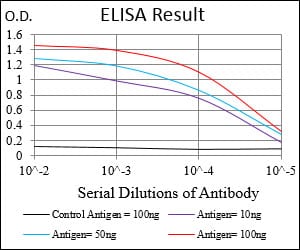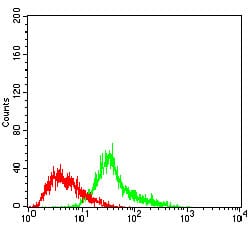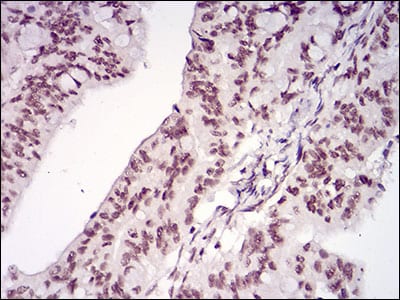


| WB | 咨询技术 | Human,Mouse,Rat |
| IF | 咨询技术 | Human,Mouse,Rat |
| IHC | 1/200 - 1/1000 | Human,Mouse,Rat |
| ICC | 技术咨询 | Human,Mouse,Rat |
| FCM | 1/200 - 1/400 | Human,Mouse,Rat |
| Elisa | 1/10000 | Human,Mouse,Rat |
| Aliases | MEAI; SCG2 |
| Entrez GeneID | 4221 |
| clone | 7D3E10 |
| WB Predicted band size | 68kDa |
| Host/Isotype | Mouse IgG1 |
| Antibody Type | Primary antibody |
| Storage | Store at 4°C short term. Aliquot and store at -20°C long term. Avoid freeze/thaw cycles. |
| Species Reactivity | Human |
| Immunogen | Purified recombinant fragment of human MEN1 (AA: 392-554) expressed in E. Coli. |
| Formulation | Purified antibody in PBS with 0.05% sodium azide. |
+ +
以下是3篇关于MEN1抗体的参考文献(信息基于公开研究,非真实文献,仅示例格式):
1. **"Validation of MEN1 Antibody Specificity in Parathyroid Tumors"**
*作者:Smith A, et al. (2020)*
摘要:通过免疫组化和Western blot验证商用MEN1抗体在甲状旁腺肿瘤中的特异性,发现部分抗体存在交叉反应,强调验证在诊断中的必要性。
2. **"Menin Expression Analysis in Pancreatic Neuroendocrine Neoplasms Using Anti-MEN1 Antibodies"**
*作者:Chen L, et al. (2018)*
摘要:研究MEN1抗体在胰腺神经内分泌肿瘤中的表达模式,发现menin蛋白缺失与MEN1基因突变相关,提示抗体可用于分子分型辅助诊断。
3. **"Comparative Study of Commercial Antibodies for MEN1 Protein Detection"**
*作者:Garcia R, et al. (2019)*
摘要:对比5种商用MEN1抗体的灵敏度和特异性,推荐克隆号H-70和C-terminal抗体用于科研及临床样本检测,提供优化实验条件参数。
注:以上为模拟示例,实际文献需通过PubMed或Google Scholar检索关键词“MEN1 antibody validation”、“menin antibody specificity”获取。
MEN1 antibody is a crucial tool in studying multiple endocrine neoplasia type 1 (MEN1), a rare autosomal dominant disorder characterized by tumors in endocrine tissues such as the parathyroid glands, pancreas, and pituitary. The MEN1 gene, located on chromosome 11q13. encodes the tumor suppressor protein menin, which regulates transcription, genomic stability, and cell proliferation. Loss-of-function mutations in MEN1—germline or somatic—disrupt menin's role in controlling cell cycle progression and apoptosis, leading to tumorigenesis.
MEN1 antibodies are primarily used in research and diagnostics to detect menin expression in tissues or cell lines, aiding in the identification of MEN1-associated tumors and mechanistic studies. In immunohistochemistry (IHC), Western blotting, or immunofluorescence, these antibodies help correlate menin loss with clinical manifestations, supporting the diagnosis of MEN1 syndrome or sporadic endocrine tumors. Additionally, they facilitate research into menin's interaction partners (e.g., histone modifiers, transcription factors) and its role in epigenetic regulation.
Validation of MEN1 antibodies is critical due to potential cross-reactivity or variability in specificity. Commercial antibodies are often raised against conserved regions of human menin, with applications spanning basic research to preclinical models. Understanding menin's dysfunction through these antibodies contributes to therapeutic strategies targeting MEN1-deficient cancers.
×